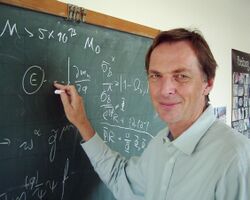Biography:Christof Wetterich
Christof Wetterich | |
|---|---|
 | |
| Born | 1952 Freiburg, West Germany |
| Alma mater | Freiburg University |
| Known for | Functional renormalization, quintessence, Wetterich equation |
| Awards | Max-Planck Research Prize (2005) |
| Scientific career | |
| Fields | Theoretical physics |
| Institutions | Heidelberg University |
Christof Wetterich (born in 1952) is a German theoretical physicist.
Biography
Born in Freiburg, Wetterich studied physics in Paris, Cologne and Freiburg, where he received his PhD in 1979. He worked at CERN in Geneva and DESY in Hamburg. Since 1992 he has a chair for theoretical physics at Ruprecht-Karls-Universität Heidelberg. His major research interests are cosmology and particle physics. The development of the theoretical method of functional renormalization by Wetterich has found applications in many areas of physics, e.g. it provides a suitable framework to study quantum gravity (asymptotic safety),[1] Yang-Mills theories[2] and it was also useful in non-relativistic quantum systems like the BCS to BEC crossover where it bridges the two theories in a unified theoretical language.[3][4]
Wetterich is best known for his proposal[5][6] of dynamical dark energy or quintessence in 1987. This could explain the observed accelerated expansion of the Universe. He has done fundamental work for the theoretical understanding of tiny masses of neutrinos[7][8] The method of functional renormalization relates macro physical structures to micro physical laws in a continuous way. Its modern form is based on the exact Wetterich equation.[9][10]
Honours and awards
Wetterich received the Max-Planck Research Prize[11] in 2005. Since 2006 he is member of the Heidelberg Academy of Sciences.[12]
References
- ↑ Reuter, M. (1998-01-15). "Nonperturbative evolution equation for quantum gravity". Physical Review D (American Physical Society (APS)) 57 (2): 971–985. doi:10.1103/physrevd.57.971. ISSN 0556-2821.
- ↑ Reuter, M.; Wetterich, C. (1994). "Effective average action for gauge theories and exact evolution equations". Nuclear Physics B (Elsevier BV) 417 (1-2): 181–214. doi:10.1016/0550-3213(94)90543-6. ISSN 0550-3213.
- ↑ Diehl, S.; Gies, H.; Pawlowski, J. M.; Wetterich, C. (2007-08-01). "Flow equations for the BCS-BEC crossover". Physical Review A (American Physical Society (APS)) 76 (2): 021602. doi:10.1103/physreva.76.021602. ISSN 1050-2947.
- ↑ Diehl, S.; Floerchinger, S.; Gies, H.; Pawlowkski, J.M.; Wetterich, C. (2010-07-19). "Functional renormalization group approach to the BCS-BEC crossover". Annalen der Physik (Wiley) 552 (9): 615-656. doi:10.1002/andp.201010458. ISSN 0003-3804.
- ↑ Wetterich, C. (1988). "Cosmology and the fate of dilatation symmetry". Nuclear Physics B (Elsevier BV) 302 (4): 668–696. doi:10.1016/0550-3213(88)90193-9. ISSN 0550-3213.
- ↑ The Cosmon Model for an Asymptotically Vanishing Time Dependent Cosmological "Constant", C. Wetterich, Astron. Astrophys. 301, 321 (1995), arXiv:hep-th/9408025v1
- ↑ Wetterich, C. (1981). "Neutrino masses and the scale of B-L violation". Nuclear Physics B (Elsevier BV) 187 (2): 343–375. doi:10.1016/0550-3213(81)90279-0. ISSN 0550-3213.
- ↑ Lazarides, G.; Shafi, Q.; Wetterich, C. (1981). "Proton lifetime and fermion masses in an SO(10) model". Nuclear Physics B (Elsevier BV) 181 (2): 287–300. doi:10.1016/0550-3213(81)90354-0. ISSN 0550-3213.
- ↑ Wetterich, Christof (1993). "Exact evolution equation for the effective potential". Physics Letters B (Elsevier BV) 301 (1): 90–94. doi:10.1016/0370-2693(93)90726-x. ISSN 0370-2693.
- ↑ Berges, Jürgen; Tetradis, Nikolaos; Wetterich, Christof (2002). "Non-perturbative renormalization flow in quantum field theory and statistical physics". Physics Reports (Elsevier BV) 363 (4-6): 223–386. doi:10.1016/s0370-1573(01)00098-9. ISSN 0370-1573.
- ↑ There exists a short public video (German) as a film portrait to the winners in addition.
- ↑ Portrait at the HAW homepage
External links
- Christof Wetterich's homepage at the Institute for Theoretical Physics at Heidelberg University
- Scientific publications of Christof Wetterich on INSPIRE-HEP
